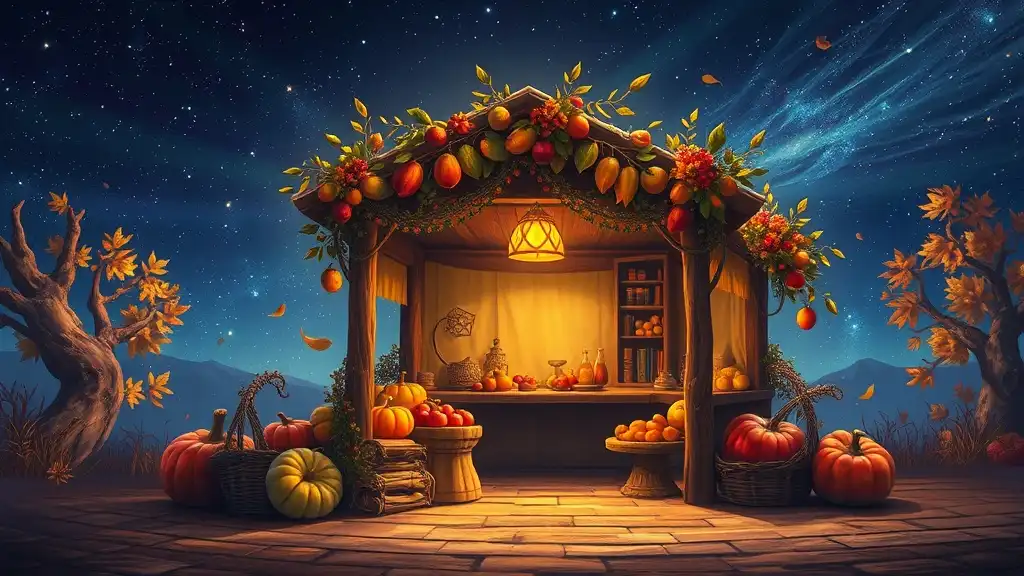Succoth, also known as the Feast of Tabernacles, is one of the most significant and spiritually enriching festivals in the Jewish calendar. Rooted in history and tradition, Succoth invites participants to engage deeply with themes of gratitude, community, and the divine connection to nature.
Historical Context of Succoth
The origins of Succoth are embedded in Jewish tradition and the narrative of the Exodus. It commemorates the journey of the Israelites as they escaped slavery in Egypt and wandered in the desert for 40 years. This festival celebrates not only their physical journey but also their spiritual evolution as a people.
During Succoth, Jews are reminded of their humble beginnings and the sheltering presence of God during their wandering. The festival follows Yom Kippur, highlighting a transition from solemn reflection to joyous celebration, as it marks the end of the agricultural year and the gathering of harvests.
Symbolism of Succoth
At the heart of Succoth is the temporary shelter, or Sukkah. These structures are often made of natural materials and serve as a profound symbol of both transience and divine presence. During the festival, participants live in these fragile structures, which evoke the Israelites' reliance on God for protection and sustenance. This practice speaks to the themes of humility and dependence, reminding us that material possessions are fleeting.
Moreover, Succoth is a harvest festival, signifying gratitude for the abundance provided by the earth. It encourages a spirit of appreciation for the sustenance we receive, emphasizing that gratitude is a vital aspect of spiritual life. When we pause to acknowledge our blessings, we cultivate a deeper connection to the divine.
Spiritual Themes of Succoth
Reflection and Evaluation
Succoth serves as a powerful time for introspection and personal evaluation. As the year comes to a close and we prepare to enter a new cycle, it is essential to contemplate our spiritual journey. What lessons have we learned over the past year? How have we grown? This period invites individuals to identify areas for improvement and set spiritual intentions for the coming year.
Through communal worship and individual reflection, participants can examine their values, relationships, and spiritual beliefs, laying the foundation for deeper personal growth.
Community and Connection
The festival also emphasizes the importance of community bonds. Succoth calls for gathering with family and friends, sharing meals and experiences within the Sukkah. It’s not just a time of celebration; it also embodies a spiritual practice of hospitality. Welcoming others into your Sukkah reflects a commitment to communal unity and love, affirming the shared journey of life’s challenges and blessings.
The act of coming together for prayer and celebration fosters connections that transcend individual experiences, reinforcing the idea that we are all part of a larger spiritual family.
Rituals and Practices During Succoth
Building the Sukkah
Constructing the Sukkah is a ritual filled with spiritual significance. As each individual or family builds a Sukkah, they participate in a process that embodies their connection to tradition, community, and the divine. The Sukkah's construction involves using natural materials, encouraging a return to nature and a reminder of our dependence on it.
Offering shelter to all who enter symbolizes embracing the divine presence in our lives, reflecting openness and acceptance. As we dwell in our Sukkahs, we connect to the past and recognize the continuous flow of tradition into our lives.
Daily Rituals
The daily rituals during Succoth include special prayers and blessings that enhance the spiritual atmosphere of the festival. These observances serve not only as expressions of gratitude but also as invitations to joy and connection.
Each day of Succoth involves the ritual of waving the Four Species (etrog, lulav, hadas, and aravah), which symbolize various aspects of creation and the unity of diverse ecosystems. This practice reinforces the importance of harmony with nature and our responsibility towards it. Joy and celebration are crucial in this festival, as participants are encouraged to reflect on the happiness of their faith and community connections.
Lessons from Succoth
One of the most profound lessons of Succoth is the understanding of transience and impermanence. The temporary nature of the Sukkah serves as a reminder that the material world is fleeting. This teaches us to appreciate the present moment and focus on what truly matters: relationships, spiritual growth, and divine connection.
Additionally, Succoth encourages a spirit of gratitude and appreciation. By recognizing and celebrating the abundance in our lives, we cultivate a habit of acknowledging the positive aspects of our day-to-day existence. This attitude shift can lead to deeper contentment and a more fulfilling life.
Succoth in Modern Spirituality
In contemporary spiritual practice, the lessons of Succoth hold tremendous relevance. As many individuals seek ways to connect to their spiritual roots, the themes of gratitude, community, and reliance on nature become cornerstones of modern spirituality. Participants can integrate the teachings of Succoth into their daily lives by practicing mindfulness and gratitude, connecting with their community, and embracing the beauty of simplicity.
Engaging with the spiritual dimensions of Succoth allows for a deeper understanding of one’s place in the world, fostering a sense of belonging and purpose.
Conclusion
Succoth is much more than a historical observance; it is an invitation to engage with profound spiritual teachings. The significance of the Sukkah, the themes of gratitude and community, and the opportunity for reflection and growth create a rich tapestry of spiritual experience. Embracing the lessons of Succoth can lead to a more connected and meaningful life, encouraging us to celebrate, reflect, and express gratitude for the journey we share.
Call to Action
Incorporate the spirit of Succoth into your life by exploring its teachings and engaging with your community. Take time to reflect on your year and set spiritual intentions for the future. Embrace the beauty of connection, gratitude, and impermanence as you journey through life.












